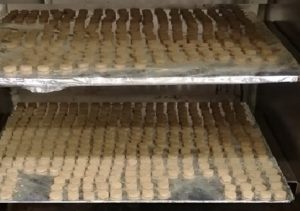During the production of the biodiesel targeted within this project, the transesterification reaction of animal fats in supercritical conditions has improved its efficiency by using basic catalysts shaped by laser sintering (SLS), which has allowed the preparation of monoliths of high porosity and high versatility in terms of shape and dimensions.
The catalysts commonly used in biodiesel synthesis are basic in nature and are found in homogeneous form. Their use requires additional stages of neutralization and separation, making the overall biodiesel production process more difficult and expensive. These problems can be avoided by using heterogeneous catalysts, and more specifically, heterogeneous shaped catalysts (monoliths).
However, is it feasible to use heterogeneous catalysts to obtain biodiesel efficiently and sustainably under supercritical methanol conditions out of animal fats extracted from the residue generated in the tanning industry?
The answer is yes. One of the main objectives of this project is indeed to manufacture SLS catalytic monoliths with good geometry and high mechanical strength and catalytic activity, which allow their use in this process.
In the manufacture of catalytic monoliths, the first step has been the development of new catalytic formulations in powder form and their quality control through their physicochemical characterization, in order to have the starting raw material.
Once the quality controls were passed, the shaped catalysts (monoliths) were manufactured using SLS to obtain catalysts with the appropriate geometry and mechanical strength.
Finally, the quality control of the shaped catalyst (monoliths) was carried out by means of a new physicochemical characterization and the assessment of its catalytic activity in the transesterification of animal fats with methanol in a supercritical state, in order to confirm that it meets the required quality standards.
The catalytic results obtained have shown that these shaped catalysts significantly reduce the reaction time, facilitate the use of milder reaction conditions (lower pressure and temperature), prevent biodiesel degradation, lower production costs due to its easy recovery and regeneration, and reduce the environmental impact.
Additionally, its use can be transferred to other industries such as refineries, pharmaceuticals, food, and petrochemicals that also use basic catalysts in their own processes.








Comments are closed.